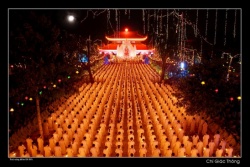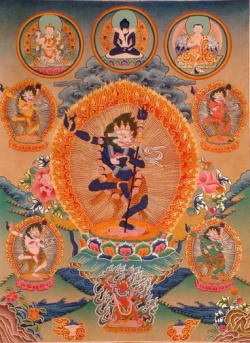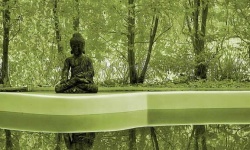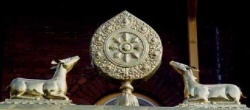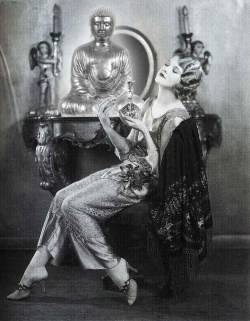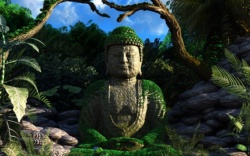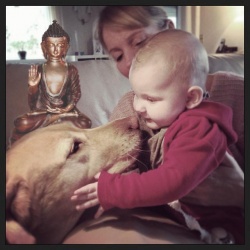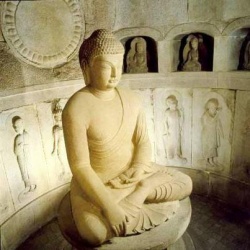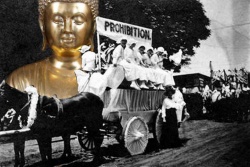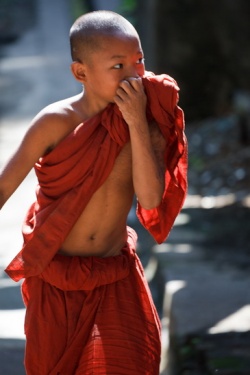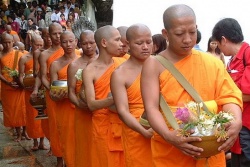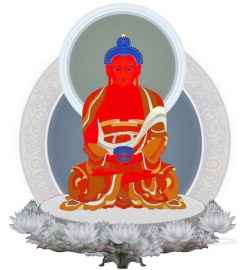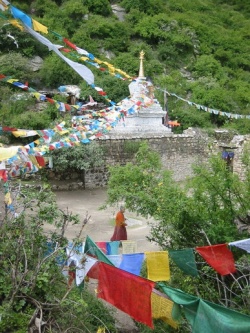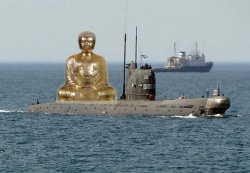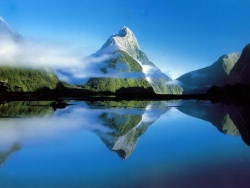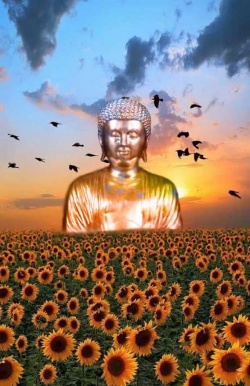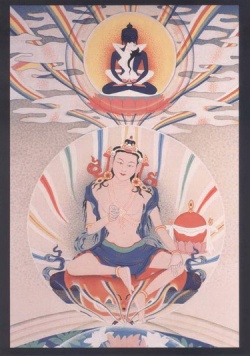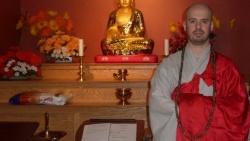A Study On The I-Pu-Tsung-Lun-Lun by Tao-Wei Liang: Causes Of The Spliting Of The Sangha
A Study On The I-Pu-Tsung-Lun-Lun
Tao-Wei Liang
中華學術研究院駐外副研究員
Chapter II Causes Of The Spliting Of The Sangha
The splitting of the Sangha was by no means a sudden happening with merely a single cause, it was, however, a gradual fermentation with many causes and through several centuries. According to the account in our text (the I-pu-tsunglun-lun) the original split of the Sangha was caused by the five evil views of Mahadeva,[1] who was then living in a monastery called Kukkutārāama[2] in Kusumapūtra[3] in the Magadha kingdom, during the reign of Asoka.[4] This fact is, only one of the many causes; if we want thoroughly to know those many other causes, we must investigate those questions which were discussed in the three (or four) councils:[5]
1 The First Council
According to the tradition recorded in several different texts[6] in the Chinese translation of the Vinaya-pitaka, all unanimously say that the first council was held at Rājagṛha immediately after the parinirvāṇa of the Buddha. In the Dharmagupta vinaya[7] says that Mahākasyapa was not present at the mahāparinvāṇa of the Buddha at Kusinārā. While he was proceeding from Pāvā to Kusinārā with 500 great bhiksus, the news of the decease of the Buddha was brought to him by an ascetic of the Ajivaka sect. On hearing of this woeful news these monks who were not free from passions, were vociferous in their lamentations. Among the 500 there was then a bhiksu called Pananda[8] exhorted those monks saying: "Elders, just stop, and don't be so distressed as to cry like that! We are free from that 'makala' (fool), when he was living he often instructed us "You ought to be thus, you ought not to be thus; you should not do that." Now we are free, we can do what we like and reject what we dislike."
It may be observed in this connection that Bhānanda (or Sudhadda) was not the only person to have such thoughts. There were many others who felt that with the passing of the Buddha the Dharma he had taught would disappear. This general feeling of doubt and consternation as having been the motive for the convocation of the first council.[9]
The proceedings of the First Council achieved three results:
- 1) the settlement of the Vinaya under the leadership of Upāli.
- 2) the settlement of the Sūtra pitaka under the leadership of Anānda.
- 3) the settlement of the Abhidharma-pitaka.[10]
Besides these results there were unharmonies among the few great disciples, as in the Mahisāsaka-nikāya-pancavarga-vinaya says that after Mahākāsyapa proclaimed the settlement of the vinaya and Sūtra pitakas Ananda said to Kāsyapa: "I learned from the Buddha that after His parinirvāna if monks want to remove minor disciplines, allow them do it. " Then Kāsyapa asked Ananda: "What disciplines do you think are minor ones?" Ananda: 'I did not ask the Buddha." Why did you not ask?" "Because at that time the Buhddha was feeling pain on his body, and I was afraid that it would annoy him. "Kāsyapa then said: "Because you did not ask the Buddha you have committed the Duskrta (wrongdoing, or evil action), you should see your crime and repent before the Sangha. " Ananda said: "1 did not ask the Buddha because I was afraid that it would annoy Him. It does not mean that I hold any irreverence toward the disciplines. I cannot see there is any sign of crime in this, anyhow I will respect you and repent before the Sangha. "
Kāsyapa then charged Ananda with another crime saying that Ananda had trod upon a garment of the Buddha while sewing it as there was no one to help him. Then Ananda leaded and also made repentance before the Sangha.
Kāsyapa then charged Anand a with a third crime, because he had three times asked the Buddha to admit women into the Order of Sangha. The fourth charge is because Ananda did not ask the Buddha to stay in this world for a kalpa, though the Buddha thrice mentioned that a person who has the four supernatural powers could prolong his life to a kalpa or longer than a kalpa.
The fifth charge is because Ananda did not supply drinking water to the Buddha though He had thrice asked for it.
The sixth charge is because Ānanda had permitted some women to salute first the body of the Buddha after His parinirvāna.
Ānanda pleaded to Kāsyapa's charges one by one and also made repentances before the Sangha in order to pay respect to Kāsyapa.[11]
It was just after the trial of Ānanda, when the Venerable Pūrna arrived with his fonowers from the south and asked Kasyapa to repeat the Vinaya, the Sutra and the Abhidharma pitakas which they had just settled. Then Kāsyapa repeated them again as before. After Kasyapa finished the repeatitions, Pūrna said to Kāsyapa: "I have learned from the Buddha that (1) to keep food materials, (2) to keep cooked food, (3) to cook for oneself, (4) to take food by oneself, (5) to receive food from others, (6) to pick fruit from trees, (7) to pick fruits out of bodies of water. These seven items are allowed as not being impure. "
Kāsyapa said: "These seven items were allowed by the Buddha only temp-or arily in Vaisāli, when there was a famine and because it was very difficult to get food by begging. But afterwards, four items were prohibited in Vaisāli; and when the Buddha arrived at Rājagrha the other three items were also prohibited again. "
Pūrna said: "The Buddha should not allow at first, and then prohibited again."
Kāsyapa said: "The Buddha was the master of the Dharma, He had the sovereignty to all dharmas, even he allowed at first and then prohibied again, what error could there be?"
Then Pūrna said: "I would bear other things, on]y cannot keep these seven items!"[12]
2. The Second Council
The five different Vinaya texts[13] unanimously say that the Second Council was held at Vaisāli, a century after the parinirvāna of the Buddha. It is recorded that the monks of the Vrji country. were in the habit of practising the Ten Indulgences (dasa vatthuni) which were regarded as impurities by Yasa, and he declared these practices to be mega) and immoral in the extreme. The Ten Indulgences recorded in the four vinaya texts[14] are slightly different from each other. In the Mahisāsaka vinaya they are recorded as follows:
- 1) It is allowed to keep salt and ginger. This is not impure.
- 2) After meal time if one got extra food and picks up with two fingers and to eat is allowed. (The interpretation of the southern tradition is: To take meals slightly after mid-day, that is when the shadow is two finger broad).[15]
- 3) After a meal if there is another chance to eat one can sit down and eat again. This is allowed as not impure.
- 4) To go to another village and to have .a second meal there on the same day is allowed.
- 5) To drink honey mixed with butter is allowed.
- 6) To drink half brewed wine is alIowed.
- 7) To make a cloth mat the size of one's choice is alIowed.
- 8) To practise what one has learned before is alIowed.
- 9) To ask someone to inquire after a friend's health is allowed.
- 10) To accept gold and silver and to keep them is allowed.
The story connected with the tenth Indulgence goes like this: "All the Vrji bhiksus on every 8th, 14th, and 15th sit together in the swarming streets with their begging bowls filled with water in front of them as a sign of auspice. When people pass by, they will point to their begging bowls and say: "For good luck please give Some money for buying cloth, bowls, shoes and medicine." Some people gave them money, some people rejected them and saying: "Sramanas, the sons of the Buddha should not receive money, even if people give money they should not look at it. Now, why should you beg for money from people?"
In the meantime. Yasa, the son of Kākandaka was in the towered meeting hall by the side of the Monkey River, he said to all bhiksus: "You should not beg for money, I learned from the Buddha that if one begs not according to the dharma, or one bestows not according to dharma, both of them are guilty."
When those bhiksus got money they offered one share to Yasa, but he refused and said: "I cannot accept the aIms obtained not according to the dharma. "
Those bhiksus said: "If you do not accept, you may give it to others."
Yasa said: "As I do not accept; why should I give it to others?"
Then all bhiksus deemed that Yasa's former instruction charged and put blame on the laity, so they pronounced the penalty of patisāraniya-karma[16] upon him.
Yasa defended his own view before the laity and by his elequent advocacy won them over" to his side. This increased the fury of the offending monks who pronounced the punishment of unkhepaniya-karma[17] upon him; which meant his virtual expulsion from the Sangha. After the sentence of excommunication had been passed on him, he went to Pācinā, where he got 60 pātheyyā bhiksus who would support him to subdue those Vrji bhiksus. And in Watūra there were 30 Pātheyyā bhiksus, who also agreed with Yasa and would support him to extinguish the evil deeds of Vrji bhiksus. Again in Alavi he get the support of 30 Pātheyyā bhiksus. Then they went to Ahoganga where they met the elder Sambhūta, and told him about the Ten Indulgences of the Vrji bhiksus, and wanted him to join their party to discuss the vinaya and subdue those Vrji bhiksus. Then they went to Kausāmbi where they met elder Ravata, who also agreed to support Yasa and extinguish the evil deeds of Vrji bhiksus, but he suggested that a suitable place for their meeting would be Vaisāli. So they altogether went to Vaisāli, where they met Venerable Sarvagāmin and asked him whether it is pure to keep salt and ginger? But Venerable Sarvagāmin advised them that they had better ask him this question before the Sangha, otherwise those unlawful bhiksus will think that he is partial to Yasa. Thereupon elder Revata convoked a meeting of all bhiksus in order to discuss the vinaya, but the meeting was rather tumultuous and they could not arrive at any decisions; therefore Revata proclaimed that each party should select four monks as its representatives to discuss problems and made dicisions for each party.
Then the Vrji bhiksus firstly selected their own representatives:
- 1) Sarvagāmin
- 2) Reyata
- 3) Kubjasobhita
- 4) Sumana
Pātheyyā bhiksus also selected their four monks as delegates:
- 1) Sambhūta
- 2) Sāla?
- 3) Dirghakesa
- 4) Vasayagrāmika?[18]
At the meeting of these eight representatives Revata asked questions and Sarvagāmin answered. One by one, Revata brought up the Ten Points and asked for his opinion. But, Rarvagāmin's answers were altogether negative, and Venerable Revata declared them one by one as invalid, and he also made a conclusion and said: We have already settled the Vinaya, if it is not what the Buddha had established, we should not establish it in vain; if it is what the Buddha had established, we should not refuse it. We should learn earnestly according to the Buddha's teachings. "[19]
3. The Third Council
The Third Council According to both northern and southern traditions the third counil was held at Pātaliputra under the reign of Asoka, and both traditions agree that from this Council the Crder of the Sangha first split into Sthaviravāda and Mahāsangika. But concerning the cause of the first spliting of the Sangha, the southern tradition only mentions that after Moggaliputta Tissa had converted Asoka. Buddhist monasteries were granted large donations and the monks lived in ease and comfort. The heretics who had lost their income and honour were attracted by these prospects to enter the Buddhist Order. But they continued to adhere to their old faiths and practises and preached their doctrines as being the doctrines of the Buddha.[20] While according to the northern tradition the first spliting of the Sangha was caused by the discussion of Mahādeva's five Points.[21] The detailed record of Mahadeva's story is found in the Abhidharma-Mahāvibhāsāsāstra:[22] "There was a merchant in Mathurā, he married during his early age, and his wife gave birth to a son, as the child was quite handsome they gave him the name Mahādeva. Later on the merchant went abroad with precious goods, and for many years he was occupied with his business and had no chance to return home. The son had already grown up and had incestuous relations with his mother. One day he learned that his father would soon come back. In his fear he plotted with his mother and when his father returned killed him. As he had committed a great sin (unintermitted karma), the fact gradually became known to others, so he slipped away with his mother and went to Pātaliputra.
Later he met an Arhat bhiksu who came frum his home twon. He was the very monk his mother had often made offerings to. Because he was afraid that the monk would reveal his sin, he tricked and murdered the monk. As he had committed a second grave sin (uninter-mitted karma) his mind became more grievous. Then he found that his mother was having relations with another man, so he was filled with anger and said to his mother: "For your sake I committed two grave sins, and have been wandering alone in foreign countries without peace; but now you want to shift your love from me to another man, how can I bear such filthy deeds from you!" Hence he again plotted and murdered his mother.
After he had committed this third grave sin. because his virtuous good roots were still not cut off, he was overwhelmed with grief and regret, and was always thinking with an unpeaceful mind as to how to extinguish his grave sins. He learned that sramanas have the dharma which can extinguish sins. He then approached the Kukkutārāma monastery. Outside the gate he met a bhiksu who walked slowly and recited the following gātha:
- "If one has committed a grave sin,
- To cultivate virtues can remove it;
- He can then shine over the world,
- As when the moon emerges from the clouds. "
When he heard this his mind was leaping with joy and knew that if he took refuge in Buddhism his sins would certainly be extinguished. Thereupon he went to a bhiksu's place and earnestly asked to be ordained. In the meantime, the bhiksu did not ask him any questions and directly ordained him and still called him Mahādeva and taught him disciplines.
Mahādeva was intelligent. Not long after his ordaination he could already recite and keep the literary meaning of the tripitaka. His words were clear and skilful and he was able in teach others, so he was greatly respected by the people of Pātaliputra. The king hearing of his fame often invited him to the inner palace, payed him respect, made offerings to him and asked him to expound the dharma.
When he came back from the palace to the monastery he harboured some impure thoughts in his mind, and in his dreams he often had nocturnal emissions. Though he had formerly said that he was an Arhat, yet he let his disciple wash his defiled garments. Then his disciples asked him: "An Arhat has already ended all outflows (passions), how could you, my master, still have such things?"
Mahādeva said: "I was fascinated by the Devi Mara, you should not wonder. Briefly speaking there are two kinds of outflows: one is passions, the other is impurities; concerning the outflow of passions, an Arhat is already free from them; yet he cannot be free from the outflow of impure things. The reason is that although Arhats have put an end to their passions how could they not have discharges such as mucus. saliva and so on. But the Mara always dislike the Dharma. When they see a person cultivating virtue, then they will come and destroy his virtue. Even an Arhat can be disturbed therefore my outflows are produced by Maras, now you should not doubt and wonder." This is called the samutthāna[23] of the first evil view.
Again Mahādeva, in order to please disciples and make them become more adherent to his teachings, established the false upāya of grading them with the four Fruitions. His disciples prostrated themselves before him and said: "Arhats should have the wisdom of realization, while we altogether know nothing about ourselves?" Then he said: "Arhats also have ignorance, you should not Joss your confidence. Briefly speaking, there are two kinds of ignorance: 1) the defiled ignorance which an Arhat is already free from; and 2) undefiled ignorance which an Arhat still has; hence you cannot know about yourselves. "This is called the samutthāna of the second evil view.
All disciples asked him again: "We have heard that the sages are already free from doubts, while we still have doubts about the true reality?" He answered: "Arhats also have doubts, there are two kinds of doubts: 1) the doubts which rise from anusāya, Arhats are free from them; 2) the doubts concerning decision and undecision, Arhats are still not free from them. Evew pratyeka-buddhas still have doubs, how could you srāvakas be free from such doubts? Don't for this reason feel to be inferior." This is called the samutthāna of the third evil view.
Later his disciples read sutras and they found that in the sūtra it says that Arhats have the eye of holy wisdom, and that they can realize their own emancipation. So they asked their master: "If we are Arhats we should be able to realize our emancipation, but why only through our master's guidance and completely without direct insight which could enable us to know our own realization?"
Then he answered: "There are many cases which prove that Arhats can know themselves only through other's guidance. For example, Sāriputra was the first one in wisdom, and Mahāmaudgalyāyana was the first one in supernatural powers, but if the Buddha did not tell them so, they could not know by themselves, how much less could you know yourselves without guidance? Therefore you should not inquire about this." This is called the samutthāna of the fourth evil view.
Though Mahādeva formerly did many evil things yet he did not cut off his virtuous good root, Later in a certain mid-night he thought about his grave sins, and did not know to which hell he would go to suffer punishment. Sorrow and fear pressed him to utter the word 'suffering' for seveal times. The disciples who lived near by the master's place heard their master's utterance and were alarmed and wondered. Early the next morning they approach their master and inquired after his health. Mahādeva said: "I am happy and at peace."
His disciples then said: "If so why did you utter the word 'suffering' last night?"
Then he said: "I was uttering the ĀIya Truth, you should not wonder If one does not utter the truth of suffering earnestly the Holy Way will never present itself before one's face; therefore I uttered the word 'suffering' several times last night. "This is called the samutthāna of the fifth evil view.
Later then Mahādeva composed a gātha about his five evil views:
- "Fascinated by others, undefiled ignorance,
- One may have doubts, but through guidance;
- Utterance gives rise to the Way Ārya,
- These are called the true teachings of the Buddha."
Afterwards the elder bhiksus at the Kukkutārāma monastery gradually passed away. On the fifteenth night during the Uposatha it was in Mahādeva's turn to mount on the sent and to elain the vinaya for the Sangha. Then he recited the gātha which he had composed before. In the meantime among the audience there were novices, learned bhiksus, bhiksus who are versed in Vinaya, and bhiksus who practise samadhi. When they heard Mahādeya's gātha they were all alarmed, and rejected him saying: "Alas, you big fool! why should you speak such nonsense? In the whole tripitaka there is such nonsense!" Then the audience read his gātha in reverse:
- "Fascinated by others, undefiled ignorance,
- One may have doubts, but through guidance;
- Utterance gives rise to the Way Ārya,
- Your words are not the teaching of the Buddha!"
During the whole night there were chaotic quarrels, and the next morning the unharmonious atmosphere between the two groups become more serious. Common people, officials, even the minister of the state came, they all in vain tried to pacify the quarrels. The king, hearing of this, also arrived the monastery, whereupon th two groups hel fast to their own views. After investigating both views the king was perplexed, he then asked Mahādeva: "Who is right and who is wrong? Now to which side shall we belong?"
Mahādeva said to the king: "In the Vinaya sūtra it says that if people went to extinguish quarrels, they must depend on the words of the majority."
Then the king asked each group to stand apart from the other: in the group of sages, there were many elder bhiksus, yet the group was small; in Mahādeva's group there were not many elder bhiksus, yet the group was much larger. The king then depended on the majority of Mahādeva's side, he rejected and subdued the others; and afterwards he returned to the palace.
In the meantime the quarrels at Kukkutāaāma continued. Later on because of the two different views the whole Sangha was separated into two sects: 1) the Sthaviravādins, and 2) the Mahāsanghikas."
This tory reveals that Mahādeva was the First Advocate of the Mahāsanghikas, and he was, of course an enemy of the Sthaviravādins. The authors of the Abhidharma Mahāvibhāsā sāstra in writing of Mahādeva's story, from their Sarvāstivādin point of view unavoidablly stirred up a scandal.[24] There are, however, also reverse evidences in both canonical and non-canonical texts, for example, 1) in the Cunanirdesa-sāstra (分別功德論)it says: "Only Mahādeva was a great bodhisattva, the others were altogether slight people. "[25] 2) in K'ui-chi's An Outline of the Yogācāryabhūmi-sāstra it says: "Mahādeva was a person of lofty fame and great virtues, he ttained the supreme fruition in his early age; therefore the king and the nobility all admired him and monks of different posions honoured him. Inasmuch as he was so prominent and pearless, hence he was disliked by many of his vulgar contemporaries. "[26]
4. The Fourth Council
According to the record of ppHsuan-chuang's[[ Travels in India[27] the fourth Council was held in Kāsmira in the four-hundredth year[28] after the nirvana of the Tathāgata. The whole story goes as follows:
"In the four-hundredth year after nirvāna of the Tathāgata, Kanishka, king of Gandhara, having succeeded to the kingdom his kingly renown reached far, and he brought the most remote provinces within his jurisdiction. During his intervals of duty he frequently consulted the sacred books of the Buddha; daily he invited a priest to enter his palace and preach the Dharma, but he found the different views of the sects so contradictory that he was filled with doubt, and he had Do way to get rid of his uncertaty. At this time the Venerable Parsva said, "Since the Tathāgata left the world many years have elapsed. The different sects hold to the treatises of their several masters. Each keeps to his own views, anb so the whole body is torn by divisions. "
The king having heard this, was deeply affected and gave way to sad regrets.
After a while he spoke to Parsva and said, "Though of no account personally, yet, thanks to the remnant of merit which has followed me through successive births since the time of the Holy One till now. I have come to my present state. I will dare to forget my own low degree, and hand down in succession the teaching of the Dharma unimpaired. I will therefore arrange the teaching of the tripitaka of the Buddha according to the various sects. "
The Venerable Parsva replied. "The previous merit of the great king has resulted in his present distinguished position. That he may continue to love the Dharma of the Buddha is what I desire above all things."
The king then summoned from for and near a holy assembly.
On this they came together from the four quarters, and, lake stars, they hurried together for thousands of Ii, men the most distinguished for talents and for holiness of life. Being thus assembled for seven days offerings of the four necessary things were made after which as the king desired that there should be an arrangement of the Dharma, and as he feared the clamour of such a mixed assembly, he said, with affection for the priestt, "Let those who nave cbtained, the holy fruit remain, but those who are still bound by worldly influences let them go!" Yet the multitude was too great. He then published another order: "Let those who have arrived at the condition of 'freedom from study' remain; and those who are still in a condition of learners go." Still there were a great multitude who remained. On this the king issued another edict: "Those who are in possession of the enlightenments and have the six spiritual faculties[29] may remain; the other can go." And yet there was a great multitude who remained. Then he published another edict: "Let those who are acquainted both with the tripitaka and the five vidays[30] remain; as to others, let them go."
Thus there remain 499 men[31] Then the king desired to go to his own country, as he suffered from the heat and moisture of this country. He also wished to go to the stone groto at Rājagrha, where Kāsyapa had held his religious assembly. The Venerable Parsva and others then counselled him saying, "We cannot go there, because there are many heretical teachers there, and different theories are prevailing, there will be clamour and vain discussion. Without having right leisure for cons ideration, what benefit will there be in making treatises?"
The mind of the assembly is well affected towards this country (Kāsmira); the land is guarded on eyery side by mountains, the Yahas defend its frontiers, the soil is rich and productive, and it is well provided with tood. Here both saints and sages assemble and abide; here the spiritual Rsis wander and rest."
After a deliberation seeing that all the assembly are clinging to Kasmira the king said: "I am willing to fall in with the wishes of Venerable parsva." Then with the Arhats, he went from the spot where they had deliber ated to another monastery, where they held an assembly for arranging the scriptures and composing the Vibhāsā sāstra.
These five hundred sages and saints (including Vasumitra) first composed the Upadesa sāstra in ten myriads of verses to explain the sūtra pitaka. Next they made the Vinaya Vibhāsā sāstra in ten myriads of verses to explain the Vinaya pitaka; and then they made the Abhidharma Vibhāsā sāstra in ten myriads of verses to explain the Abhidharma pitaka. "[32]
Footnotes
- ↑ See I-pu-tsung-Iun-Iun (T.E.T. 49, P.15a), cr. Abhidharma-mahā-Vibhāsā śāstra. 99. (T. E. T. 27, PP. 510c-511c).
The five evil views are:
- 1) That an Arhat has impure discharge. Cf. Kāthāvathu II. 1. "Atthi arahato parūp hāro."
- 2) That an Arhat may lack knowledge. Cf. Kāthāvathu II. 2. "Atthi arahato annam ti. "
- 3) That an Arhat may have doubts. Cf. Kāthāthu II, 3. "Atthi arahato vimatiti."
- 4) That the Arhat is excelled by others. Cf. Kāthāvathu, II, 4. "Atthi arahato paravitāranā ti."
- 5) That there is articulate utterance on the part of one who has entered into dhyāna. Cf. Kāthāvathu II, 5. "Yekeci duddham ti vācam bhāsanti maggam bhavanti."
- 1) That an Arhat has impure discharge. Cf. Kāthāvathu II. 1. "Atthi arahato parūp hāro."
- ↑ Travels of Hioueh-Thsang vol. III. P.329. The Southern tradition mentions it as 'Asokārāma'. Cf. Prof. Kimura's Investigation of the History of Sangiti and Schisms P. 14.
- ↑ T'an-lun mentions the city as Kusumapūtra, but both Ch'in lun and Ch'en lun mention the city as 'Pātalipūtra'.
- ↑ Asoka (294-238 B. C.) came to the throne in 273 B. C., which was the 218th year after the nirvāna of the Buddha. But in our text says that the split of the Sangha occurred about hundred years after the nirvana of the Buddha.
- ↑ According to the records of both Northern and Southern Buddhist texts that the first and the Second Councils are agree with each other. The record of the third Council found in the Mahāvibhāsā-sāstra is mainly the discussion of Mahadev's five points, but in the Southern tradition Mahādeva is completely unknown. Moreover, the Southern tradition had recorded only three Councils, the fourth Council of the Northern Buddhism (the compilation of the Mahāvibhāsā-sāstra) they even do not recognize it. Cf. 2500 Years of Buddhism P.48.
- ↑ Refer to 1) Dharmagupta vinaya; 2) Mahāsanghika-Vinaya; 3) Mahisāsaka nikāya pancavarga vinaya; 4) Sarvāstivāda Vinaya; 5) Sudarsana Vibhāsā vinaya; and Life of King Asoka.
- ↑ T. E. T. 22, PP.966a-967c.
- ↑ Both Dharmagupta vinaya (T. E. T. 22, P. 966b) and Mahisāsaka nikāyapancavarga vinaya (T. E. T. 22, P.190b) mention the name of an elder bhiksu Bhānanda, but the Mahāsanghika vinaya (T. E. T.22, P. 490a.) only mentions a 'makala' (foolish) Bhiksu and did not give the name of the person. The Sarvāstivāda vinaya (T. E. T. 23, P.445c) mentions it is a foolish and wicked old bhiksu. While only the Sudarsana vibhāsā vinaya (T. E. T. 24, P. 673c.) mentions a bhiksu called Subhadda-mahallaka.
- ↑ Cf. 2500 Years of Buddhism P. 36.
- ↑ Dharmagupta vinaya 54, (T. E. T. 22, P. 968b), but the Mahisāsaka-nikāya pancavarga vinaya did not allude to the 'Abhidharma-pitaka. (T. E; T. 22, P. 191a-b).
- ↑ a) Mahisāsakanikāya pancavarga vinaya 30 (T. E. T. 22, P. 191b-c).
b) Mahāsangika vinaya 32, (T. E. T. 22, P. 492a-b).
c) Dharmagupta vinaya 54, (T. E. T., 22, P. 967b-c).
d) Sarvāstivāda Vinaya 60, (T. E. T. 23, P. 449b-c).
Also Cf. 2500 Years of Buddhism PP.39-40.
But, in the Sudarsana vibhāsā vinaya the trial of Ānanda is not mentioned. - ↑ Mahisāsaka nikāya pancavarga vinaya 30. (T. E. T. 22, P. 191c).
Dharmagupta vinaya 54, (T. E. T. 22, P.968b-c).
But the other three vinayas did not mention Pūrna's affair. - ↑ a) Mahisāsaka nikāya pancavarga vinaya 30, (T. E. T. 22, P.192a-b). 100 years after the Buddha.
b) Mahāsangika vinaya 32, (T. E. T. 22, P.493a-b). No allusion to the year.
c) Dharmagupta yinaya 54, (T. E. T. 22, P.96Sc). 100 years A. B.
d) Sarvāstivāda Vinaya 60, (T. E. T. 23, P.449b-c). 110 years A. B.
e) Sudarsana Vibhāsā Vinaya I, (T. E. T. 24. P677c). 100 years A. B. - ↑ In the Mahāsangika vinaya only mentions the tenth Indulgence (to accept gold and silver and keep them is allowed), but did not mention the other nine.
- ↑ Cf. 2500 Years of Buddhism P. 41.
- ↑ The offender is necessitated to apologize to the laity who had been forbidden to carry out the precepts of the Vvji monks.
- ↑ He should abandon those views which caused him not to see his own guilt.
- ↑ Cf. Keisho Tuskamoto's A History .of the Farly Buddhist Order P. 220.
- ↑ Mahisāsaka Vinaya 30, (T. E. T. 22, P.194b).
- ↑ 2500 Years of Buddhism P.45.
- ↑ Samayabhedoparacanacakra (I-pu-tsung-lun-lun) T. E. T. 49, P.15a.
- ↑ Abhidharma-mahāvibhāsā 90 (T. E. T. 27, P.510c-512a).
- ↑ According to M. Monier Williams' Sanskrit English Dictionary the word 'samutthāna' means the act of rising up together. For example, when the mind arises, the speech and the action also arise.
- ↑ Refer to Thomas Watters' On Yuan-chwang's Travels in India P. 270: "All accounts seem to agree in representing their Mahādeva as a man of unusual abilities and learning; and the story of his great crime as a layman, and his unscrupulous ambition as an abbott, related in the Abhidharma treatises are probably the malicious inventions of enemies."
- ↑ Gunanirdesa sāstra I, (T. E. T. 2.5, P.32c).
- ↑ An Outline of the Yogācāryabhūmi sāstra (T. E. T. 43. P.lb).
- ↑ {{Nolinking|Travels of ppHsuan-chuang[[ Ill, (T. E. T. 51, P.886b). }}
- ↑ That is, 300 years after Asoka (B. C. 263-224), or about A. D. 75. Hsuan chuang places Asoka only 100 years after the Buddha, while in Asoka's inscriptions the Buddha is placed 221 years before the first Asoka's reign.
Cf. Beat's Travels of Hiouen-Thsang voL II, Note 97. - ↑ The trividyas and the shadabhijnās.
- ↑ The five vidyas are:
- 1) Sabdavidya, the treatise on grammar;
- 2) Adhyatmavidya, the treatise on inner principles;
- 3) Chikitsavidya, the treatise on medicine, magic formulas, and occult science;
- 4) Hetuvidya, the treatise on causes;
- 5) Silapasthanavidya, the treatise on the scinces astronomy, meteorology, and mechatecal arts.
- ↑ In this story purposely leania vacancy for Vasumitra, this is evidenvy an imitation of the First Council, in which Ānanda was rejected by Mahākāsyapa.
Cf. P.7, and note 19. - ↑ Travels of Hsuan-chuang III. (T. E. T. 51, PP.886b-887a).
